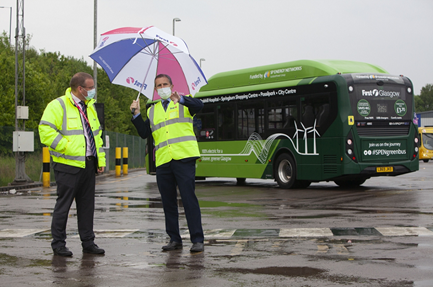First Bus begin works on UK’s biggest electric vehicle charging station at flagship Glasgow depot

Work has begun on an ambitious new project by First Bus that will transform its Glasgow Caledonia bus depot into the UK’s largest Electric Vehicle (EV) charging hub. The plans mark another major milestone on the leading transport operator’s sustainable travel roadmap and follows its pledge to only invest in zero-emission vehicles from December 2022, with a 100 per cent zero-emission fleet by 2035.
With phased completion scheduled across the next 18 months, the Caledonia depot, already the UK’s largest bus depot, is designed to have space to charge up to 300 EV buses on site. The first phase of the project, now underway, will see 11 dual DC rapid charging units installed, with an additional 69 installed in Phase Two from this summer, increasing the number of chargers on the site to 162.
Phase One of the depot transformation is expected to be complete by September this year, allowing for the introduction of a further 22 electric buses to Glasgow’s streets ahead of the COP26, the United Nations Climate Change conference.
This transformation is being supported by £35.6m in part funded by £28.2m from the Scottish Government’s Scottish Ultra Low Bus Scheme (SULEB).
Janette Bell, Managing Director for First Bus UK said:
“First Bus is at the forefront of the green transport revolution, and we continue to fast-track our efforts to surpass passenger expectations. We are proud to be announcing the UK’s largest EV charging infrastructure as part of our transition to a zero-emission fleet.
“Launching this project at Caledonia depot, the largest of its kind, is a very exciting next step and reinforces that both First Bus and our stakeholders are making continued investment in the future of bus.”
Following completion, the adapted depot will have the capability to charge 89 per cent of the depot’s electric bus fleet at the same time using smart charging software. First Bus’ long-term objective is to ensure that the site is fully prepared for the transition to a 100 per cent zero-emission fleet. This will include opportunities for further on-site renewable energy generation and storage.
Each rapid charging station at the transformed depot will be controlled via smart charging software to ensure that power is used in the most efficient way. This will minimise the draw down from the National Grid at peak times. The digital programming will also mean that each vehicle is fully charged, and the interior is preheated, ready for drivers and customers from the moment they leave the depot.

 BMW
BMW

Comments